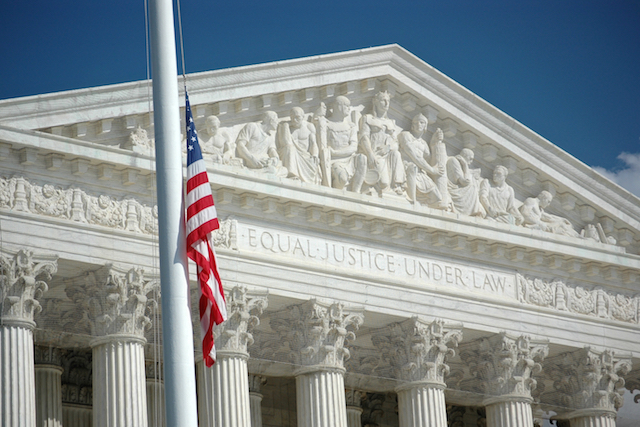It appears possible that the Supreme Court will decide on Thursday on the next major decision related to abortion. The high court — one member short — is expected to rule in the potential landmark case Whole Woman’s Health v. Hellerstedt that concerns a Texas pro-life law.
Texas’ law is arguably responsible for saving the lives of tens of thousands of unborn babies by closing abortion clinics that are unable to protect women’s health. The laws protects women’s health and welfare by requiring abortion clinics to meet the kinds of medical and safety standards that legitimate medical centers meet.
Abortion advocates challenged the law and those facility regulations and hospital admitting requirements, arguing that these clinics should not be held to the same health standards as other outpatient ambulatory facilities.
Texas Solicitor General Scott Keller argued the case before the court earlier this year and he was immediately met with skepticism from the pro-abortion members of the high court.
SUPPORT LIFENEWS! If you like this pro-life article, please help LifeNews.com with a donation!
“According to you, the slightest health improvement is enough to burden the lives of a million women,” Justice Sonia Sotomayor told him.
Justice Anthony Kennedy is the swing vote on almost any abortion case and he appeared sympathetic to the argument that abortion clinics should be expected to comply with sensible medical standards if given enough time, according to the Washington Examiner:
“Regulations sometimes take years to adopt,” Kennedy said. At another point, he suggested the lower district court could delay a final decision for a few more years, until it becomes clear whether clinics remain closed, as opponents of the law predict, or whether they manage to reopen.
Kennedy has supported some abortion limits in the past, including the federal ban on partial-birth abortion. But how far he’s willing to let states go in tamping down on abortion is not clear.
Roger Severino, director of the Heritage Foundation’s DeVos Center for Religion and Civil Society, watched the oral arguments and said he thought they went as expected. He is hopeful that Justice Kennedy will side with Texas in upholding the law.
“We had the liberal/conservative breakdown in the Court that you would expect among the justices, but Justice Kennedy, in the few questions he asked, showed some hesitation about courts second-guessing the state’s ability to regulate abortion clinics,” Severino said. “Even Justice Breyer acknowledged the state’s intent in regulating abortion clinics was a legitimate desire to help further women’s health and not for some nefarious purpose.”
“Justice Alito repeatedly challenged the plaintiffs to point to the evidence that clinics closed because of these regulations as opposed to some other reason, and asked for any evidence that the abortion industry cannot adapt to the new standards,” he added.
Severino emphasized “this case is about the ability of Texas to increase the health and safety standards at abortion clinics. The abortion industry should not get a special exemption and Texas is well within its rights to act.”
The pro-life group Texas Right to Life outlined what the court will consider when it decides the case:
Today, the Supreme Court will be considering two explicit questions in the Whole Woman’s Health v. Hellerstadt case over the Texas law:
(1) Whether, when applying the “undue burden” standard of Planned Parenthood v. Casey, a court errs by refusing to consider whether and to what extent laws that restrict abortion for the stated purpose of promoting health actually serve the government’s interest in promoting health; and
(2) whether the United States Court of Appeals, Fifth Circuit erred in concluding that this standard permits Texas to enforce, in nearly all circumstances, laws that would cause a significant reduction in the availability of abortion services while failing to advance the State’s interest in promoting health – or any other valid interest.
Both of these questions deal with the “undue burden” standard from Planned Parenthood v. Casey, which has been used to challenge every type of Pro-Life legislation across the country since 1992. Whether the abortion industry is challenging informed consent laws (like Texas’ Sonogram Bill in 2011), prohibitions on late abortions (as in Arizona in 2014), or higher medical standards (as in the current challenge to House Bill 2), the plaintiffs use the vague and undefined “undue burden” standard in all cases.
The Supreme Court has not directly addressed the issue of abortion since 2007, when the Court upheld the federal Partial-Birth Abortion Ban Act in Gonzales v. Carhart.








